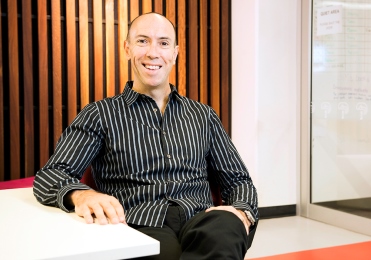18 November 2016
 GPs, physiotherapists, and other health professionals, governments, the insurance industry, pain sufferers and their carers must act together to take research into practice if we are to revolutionise treatment for the hundreds of thousands of people suffering chronic spinal pain worldwide.
GPs, physiotherapists, and other health professionals, governments, the insurance industry, pain sufferers and their carers must act together to take research into practice if we are to revolutionise treatment for the hundreds of thousands of people suffering chronic spinal pain worldwide.
Speaking in the lead up to the University of South Australia’s next Enterprising Partnerships lecture on Wednesday November 23 at 6pm - Turning off the tap: preventing chronic pain by changing acute pain care - internationally renowned neuroscientist and Chair in Physiotherapy at UniSA, Professor Lorimer Moseley says, while experts understand much more about spinal pain and the causes of pain, the path from research into practice has been too slow.
“We need a revolution in how we treat acute and chronic pain and that revolution should be founded on what we have learned in the past 20 years about different management approaches and the neurological and biological mechanisms that underpin pain,” Prof Moseley says.
“We now have better ways to treat people in pain, but we need to get the message out there to the widest range of health practitioners and most importantly to people who are suffering.”
Prof Moseley will lead a conversation with researchers and industry experts, opening up the care and treatment landscape for acute spinal pain sufferers.
“Chronic pain is actually everyone’s problem because we are all touched by it, we are all paying for it and we can all help reduce it,” Prof Moseley says.
Joining Prof Moseley is neurosurgeon and spinal surgeon, Dr YH Yau, and Chair of The Royal Australian College of General Practitioners (RACGP) SA&NT, Dr Daniel Byrne.
The event will also include a panel discussion with Lyn Dean, Executive Director Service Performance, SA Health and Michael Francis, General Manager Insurance, Return to Work SA.
“Continuing to treat spinal pain the way we always have simply isn’t justified according to scientific evidence – we can do so much better based on our new knowledge,” Prof Moseley says.
“We know that the first contact someone with back or neck pain has with a health professional is a big factor in whether or not they will recover.
“Better treatment at this critical point, and better understanding of pain’s complexity from everyone involved, stands to reduce the incidence of long term chronic pain and improve personal, social and economic outcomes.
“We have been stuck on Pain Version 1 for too long.
“Scientific discoveries have now given us Pain Version 2.0 – a protective feeling that is influenced by a wide range of factors, not just tissue damage – and we need to concentrate now on getting everyone on the same page – sufferers, their carers, their employers, their doctors, physios and claims managers.
“We need to give everyone practical ways to use this new understanding to improve outcomes.
“South Australia has a track record of leading the world when it comes to treating pain but right now we are lagging behind. We have an amazing opportunity to turn this around if we can get everyone singing from the same song sheet. It won’t be easy, but it will need teamwork and collaboration”
This stands to be a lively evening of science, practicalities and discussion. The lectures and panel discussion will be held at UniSA’s City West campus, Allan Scott Auditorium, Hawke Building, 53 North Terrace, Adelaide on November 23 from 6 - 7:30pm. You can register to attend here.
The Enterprising Partnerships lecture series showcase the vital partnerships that UniSA’s top thought leaders have with the end-users of their research and highlights the economic and societal impact of research that is inspired by real-world challenges.
Media contact: Michèle Nardelli mobile: +61 418 823 673 email: michele.nardelli@unisa.edu.au




